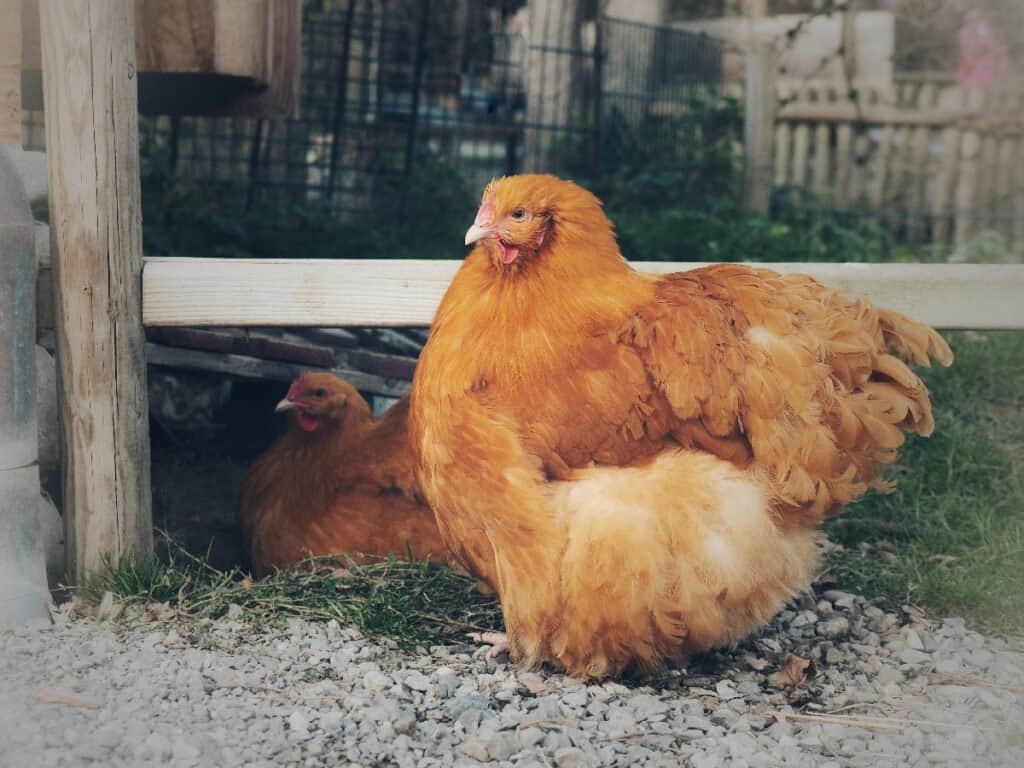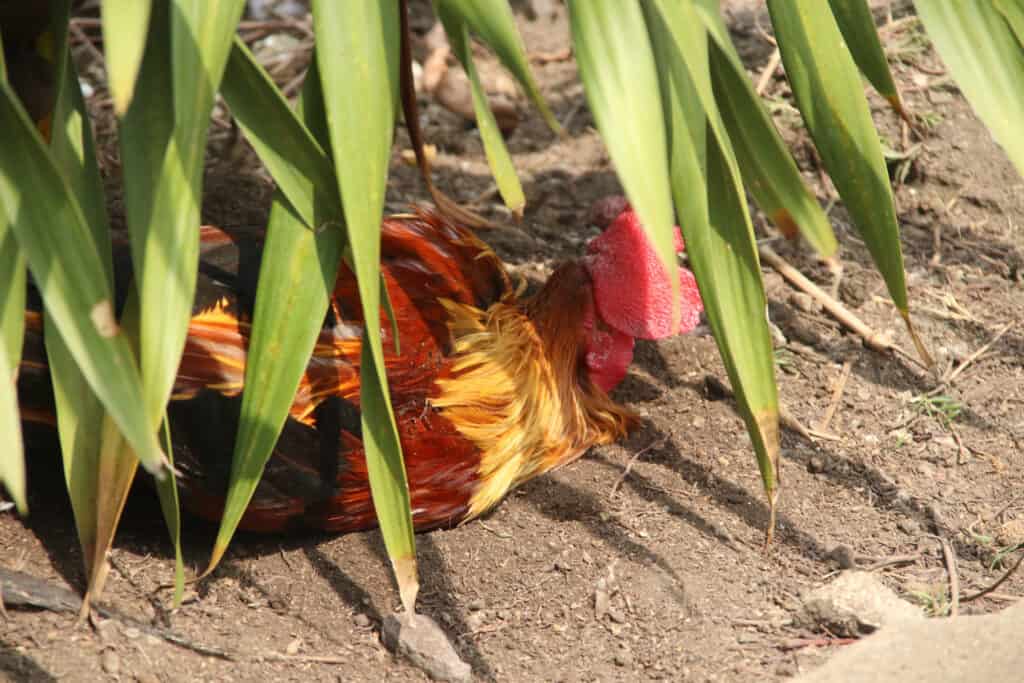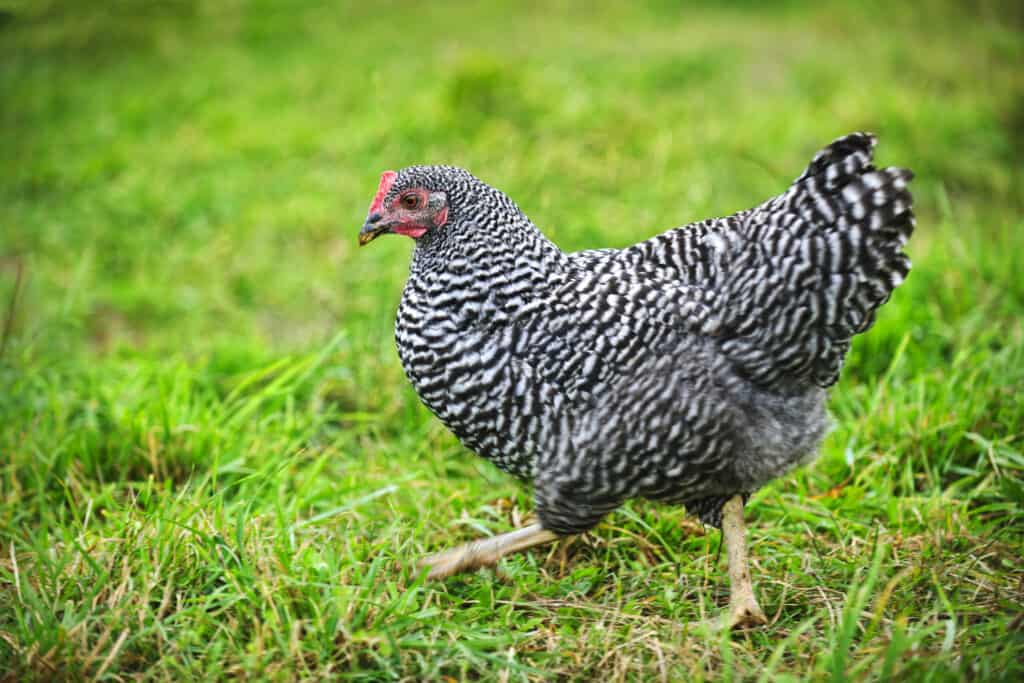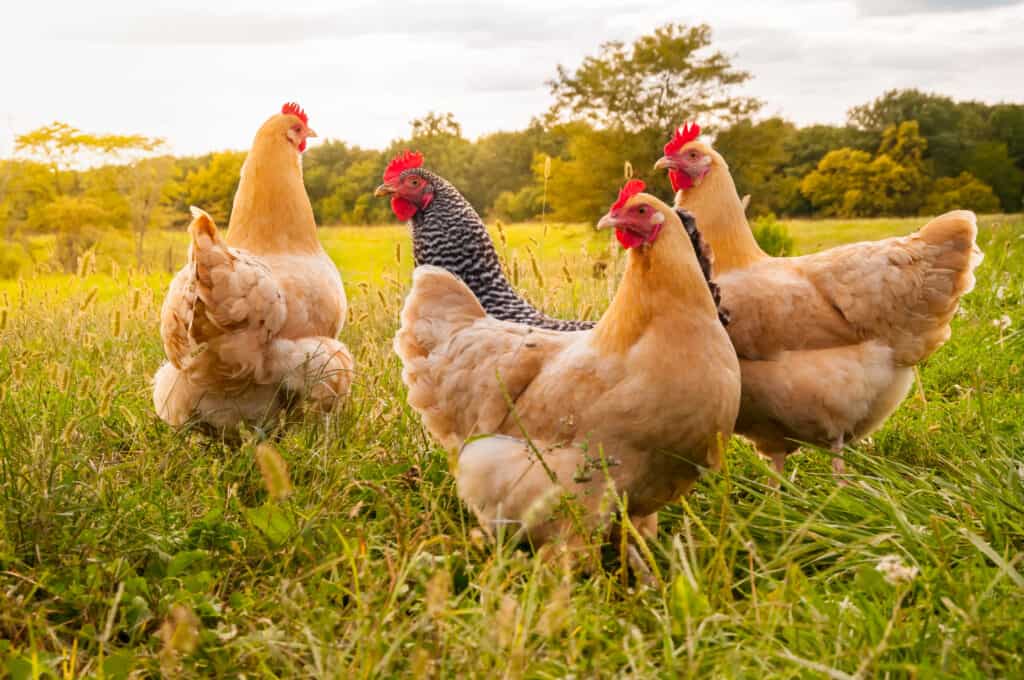There are many different breeds of chickens. Each one with its own unique characteristics. Some chicken breeds thrive in hot weather, while others do better in colder climates. Most chickens prefer a happy medium, where the temperature is not too hot or too cold. Both hot and cold weather can harm chickens, as they can suffer from heat stress and hypothermia. In this article, you’ll learn how to spot the signs and prevent distress in chickens caused by the temperature.
Temperature Extremes

Chickens can develop heat stress when the temperature gets too high and they are also susceptible to frostbite when it’s too low.
©penphoto/Shutterstock.com
Heat stress occurs when a chicken’s body temperature gets too high, causing the bird to pant and lift its wings away from its body to cool down. If a chicken becomes too hot, it can die from heat stroke. Cold weather can also be dangerous for chickens, as they are susceptible to frostbite. Frostbite occurs when a chicken’s body tissue freezes, typically on the extremities such as the wattles, combs, and toes. If a chicken’s body temperature drops too low, it can die from hypothermia. Consequently, it is essential to provide chickens with shelter from extreme weather conditions. Doing so will help ensure that your chickens remain healthy and thrive.
How Hot is Too Hot, and What Are the Signs?
Start cooling your chickens when the temperature reaches 80 degrees Fahrenheit. It can be risky when temperatures are nearly 100 degrees Fahrenheit. Heat stress and other related issues can arise at this point. Being unable to maintain an average body temperature in heat extremes causes a chicken to experience heat stress.
All other body systems experience increased pressure as a chicken’s body temperature rises. A chicken does much better in cooler weather than in hotter weather because its average body temperature is around 104°F! Chickens are much more likely to suffer heat-related illnesses because they already have high body temperatures.
Heat stress makes a chicken uncomfortable and can harm their organs, deform their eggs, and even kill them. Your chickens may be displaying symptoms of dehydration, heat exhaustion, or both if you observe any of the following in them:
- Breathing slowly and panting
- Pale combs or wattles
- Lethargic or listless behavior
- Lifting wings like a fanning motion
- Diarrhea
- Convulsions
How to Prevent and Treat Heat Stress in Chickens

Start cooling your chickens and making sure they have adequate shade at temperatures above 80 degrees.
©iStock.com/Kanjana Wattanakungchai
Your chickens need to be cooled down immediately if they display signs of heat-related illness. The quickest way to lower their body temperature is to immerse them in a bucket of ice water up to their neck.
Your birds might not enjoy this, but it could save its life. Prevention is the safer and most effective option for chickens. The best way to prevent overheating your flock is to keep them cool and hydrated. Make sure they have access to fresh water and a clean water source.
Providing shade is helpful, as well as misting the area with water. You can do this manually or buy misters. During a heatwave, it’s a good idea to buy a bag of ice so you can add a few scoops throughout the day. The chickens may not like to be wet, but gently pouring water over them will cool them off before an emergency.
How Cold is Too Cold for Chickens?
Chickens are designed to endure the cold. Although they do best in temperatures between 70 and 75 degrees Fahrenheit, they can tolerate colder temperatures if healthy. Chickens are hardy animals that can survive in temperatures well below zero.
Your chickens may freeze to death if the temperature drops too far. This typically happens if you weren’t aware that the chickens were sick or the coop wasn’t adequately prepared for the winter. Your chickens won’t die simply because of the cold temperatures if they are in good health and their enclosure is adequately prepared.
Like humans, chickens feeling the cold will appear chilly. They won’t be moving around much and will be curled up somewhere. The chicken will likely stand on one leg to keep that leg warm inside its feathers, switch legs occasionally, and fluff up its feathers. These symptoms may indicate that the temperature is too cold for your chickens. They might require shelter from you, possibly even during the day.
Best Breeds for Hot Climates

Plymouth Rock or Barred Rocks chickens are both heat and cold tolerant.
©iStock.com/Elenathewise
As a flock owner, you must consider various factors when deciding which breeds of chicken to include in your flock. Your climate is one of those elements. You’ll need heat-tolerant chicken breeds for your flock if you live somewhere where summer temperatures are usually high. Most chicken breeds thrive in colder climates, but some breeds struggle to stay cool enough in the intense heat. Because chickens don’t perspire, keeping them cool and picking the right breed for your region is essential. A few great chickens that do great in hotter climates are:
- Australorps: These are a breed of chicken that originated in Australia and does well in climates with cold winters and hot summers. These abundant egg layers are also composed of disposition.
- Delaware: Pretty feathers, wings, and tails are white with black tips are how these chickens look. They are multi-functional birds that thrive in heat and make excellent mothers.
- Plymouth: Both Plymouth Rock chickens and Barred Plymouth Rock do well in higher temperatures, though both breeds are cold and heat tolerant. These amiable chickens are excellent starter chickens because they lay large eggs.
The Best Chickens for Cold Weather
If you look out for these physical characteristics when choosing your potential flock, it should give you an idea of which chicken breeds will do well in winter. Some chicken breeds are born with features that help them combat the cold weather. Generally, a chicken’s comb size affects its vulnerability to frostbite, a potentially fatal condition. In cold weather, breeds with feathered feet or a thick coat perform better than those without. Look for breeds like:
- Silkies: Although Silkies are primarily kept as ornamental chickens and don’t have powerful egg-laying abilities, any chicken keeper who has them in their backyard is content! The Silkie is a stunning breed fiercely feathered from head to feet! They also don’t have combs; instead, they have a nice pom-pom of feathers, making them less vulnerable to frostbite than breeds.
- Cochin: Given their unusual appearance, you might mistake a Cochin for a walking ball of puffy feathers! The Cochin’s thick weight and incredibly feathered coat keep the winter chill at bay, making them an exciting animal to observe. Although they don’t lay many eggs, they are calm animals that are simple to handle.
- Dorking: If you can find a Dorking, you’ll have a bird that survives in the cold and makes an excellent mother should you decide to raise young chicks. They are a genuinely lovely, moderately heavy breed that will provide you with a respectable number of eggs and make a wonderful addition to your family.
Conclusion

Knowing the signs of stress in both hot and cold weather will help you to keep your chickens healthy and comfortable.
©Moonborne/Shutterstock.com
Keeping your chickens healthy and comfortable year-round can be a bit of a challenge, but it’s essential to properly prepare for both extreme cold and heat. In the winter, you’ll need to take measures to insulate their coop if the cold gets around 20 degrees Fahrenheit.
Moving them indoors or into a garage may also be necessary. During heat waves, on the other hand, you’ll need to make sure they have plenty of access to shade and water. Ice can make it easy on both you and your chickens.
In both cases, keeping an eye on your chickens and knowing the signs of stress will go a long way in ensuring their wellbeing. By taking the time to properly prepare for both hot and cold weather, you can help your chickens stay healthy and happy all year long.
Up Next:
The photo featured at the top of this post is © iStock.com/TETYANA LYAPI
Sources
- , Available here: https://www.mannapro.com/homestead/bid/148206/top-8-tips-for-keeping-your-backyard-chickens-cool-in-the-summer#:~:text=On%20extremely%20hot%20days%2C%20try,in%20and%20keep%20themselves%20cool.
- , Available here: https://homesteadandchill.com/keep-chickens-cool-hot-summer-weather/
- , Available here: https://www.thehappychickencoop.com/chickens-and-cold-or-freezing-temperatures/
- , Available here: https://homesteadandchill.com/caring-for-chickens-in-winter/
FAQs (Frequently Asked Questions)
What bedding is unsafe for chickens?
Pine bedding is hazardous to chickens due to the harmful effects of abietic acid on the respiratory system, the liver-damaging effects of terpene hydrocarbons and aromatic compounds, and the carcinogenic properties of pine dust.
Can chickens be in the rain?
Chickens can be in the rain if they have a waterproof shelter to which they can retreat at any time. If the rain has stormy weather, such as high winds or dropping temperatures, you may want to move them out of harm’s way.
Thank you for reading! Have some feedback for us? Contact the AZ Animals editorial team.






